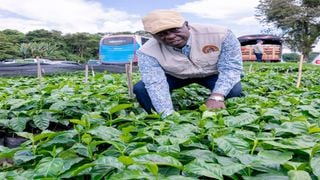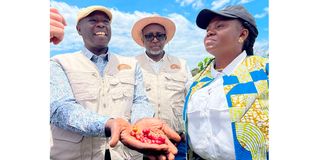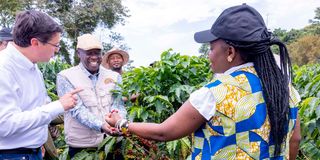
Deputy President Rigathi Gachagua at a coffee farm Chinchina, Caldas State, Colombia last month.
| DPCSWeekly Review
Premium
Why coffee cartels will be DP Rigathi Gachagua’s nightmare
Deputy President Rigathi Gachagua has finally admitted that the coffee cartels are entrenched. It is a good admission – and it will not be easy. So, let us not expect any miracles from him.
As I wrote here some months ago, summoning farmers and seeking their opinions on what to do about the sector is unhelpful. That would add to naught if we do not understand the global picture. We are now at that stage where Kwame Nkrumah warned that Africa risks becoming the producer of cheap raw materials for Western capitalists.
Once upon a time, Gachagua’s brother – the late Nyeri Governor Nderitu Gachagua – thought he could organise farmers by jointly milling and marketing coffee from the county. He banned cooperatives from selling their coffee to private millers and, instead, asked them to channel their produce through Kenya Cooperative Coffee Exporters, which would sell directly to buyers in Europe and other areas. The cartels sabotaged him, and the initiative flopped.
The Americans – now purporting to be friendly – championed the collapse of the International Coffee Organisation (ICO), a global body aiming to stabilise coffee prices and benefit both the producer and the consumer. ICO operated the same way OPEC (Organisation of the Petroleum Exporting Countries) determines the oil output and the pricing. But for coffee, the buyers determine how much they would pay. That is the irony of the coffee market.
If you look at the goals of ICO, it was a noble organisation whose goal was to “achieve a reasonable balance between the world supplies and demand… avoid excessive fluctuations in the levels of world supplies, stocks and prices”. It was to help the development of coffee in the producing nations and promote its consumption.

Deputy President Rigathi Gachagua (left) and Colombian counterpart Francia Elena Marquez visiting coffee farms in Chinchina District, Caldas State, at the Naranjal Research Farm, Colombia. Looking on is Agriculture CS Mithika Linturi.
So organised was this cartel that it had set export quotas that could only be evoked if the price fell below an accepted set price. This quota was divided among the various producers and enforced by the importing nations since coffee had a stamp indicating the country of origin. In the arrangement, quotas were suspended if the prices rose sharply, and that is how Kenyan farmers made a killing. There were also incentives given to countries that built stocks at periods of surplus. Each country knew its quota and worked to maintain that quota. For instance, Kenya had 2.5 per cent of the world market then and relied heavily on the quota system to maintain its share.
This system was sabotaged, and this is the kind of global discourse we would like to see DP Gachagua try to engage with. The Americans thought the coffee system, established in 1962, was not meeting their commercial needs. In 1989, they decided not to renew their membership of ICO and ordered us to liberalise our economy. From then on, the coffee sector was turned into a playground of Western cartels – not only for us but for the nations that could be intimidated. There is no better way of putting this: Our farmers were turned into slaves of Western coffee cartels. There was also the complication brought by the entry of Vietnam as a new player in the market, which dumped more coffee into the market.
It all started with the argument that coffee-growing nations were getting more money than they deserved and that the “international cartels” (then meaning growers) were ripping off American consumers. One syndicated columnist, Jack Anderson, wrote in 1979: “Already gouged by the oil-producing nations and a uranium syndicate that has multiplied the cost of energy, Americans are also paying twice as much as they should for their coffee. The cause: price rigging by coffee-growing countries.”
The Americans accused the coffee-producing countries of “taking action to keep prices artificially high.” Sadly, we watched the sector brought down by “our” friends. If you read the confidential congressional report that Senator Max Baucus prepared, it argued that “the price of coffee is approximately double the price that would be consistent with the historical supply-and-demand relationship”.
The Senate was being urged to intervene. By the time the US was leaving the ICO, the entire terrain had been poisoned by harsh media. That move lowered coffee prices for American consumers, raised profits for the Western food companies that sold coffee, and turned it into a slave crop where the producers earned peanuts. After the American withdrawal, coffee prices plunged, and some countries began to neglect the sector or cut down trees.
By then, three giants dominated the American coffee sector, accounting for more than 80 per cent of retail sales. These were General Foods, Procter & Gamble, and Nestle. Today, the largest players in the market are dominated by the likes of Starbucks, Dunkin’, and Tim Hortons. Sadly, we are a coffee-producing country with no value-added industries. Sixty years after independence, we are still in that space where the buyer determines the prices of our resources. Coffee is the ugly symbol of neocolonialism. The ugly face.

Deputy President Rigathi Gachagua (left) and Colombian counterpart Francia Elena Marquez visiting coffee farms in Chinchina District, Caldas State, at the Naranjal Research Farm, Colombia.
A few weeks ago, some pictures of coffee farmers in Murang’a who were uprooting the trees were trending. Even the auction is not of any help for it symbolises a competitive market – yet it is a racket. This auction house has become the platform where coffee is undervalued. When Gachagua went to Columbia for the coffee summit, one would have expected that his agenda would be the push for the revival of the 1993 Association of Coffee Producing Countries. This body was promising but collapsed in 2001 as declining coffee bean prices made it difficult for African producers to pay cartel member fees.
The other problem facing us was political and had to do with America’s relation with what was known as the Bogota Group – a group of Latin American countries led by Brazil and Colombia that had decided to control and manipulate the coffee trade to the advantage of producers.
We sided with the Bogota Group. Made of eight countries, it had incensed the Americans by stockpiling and manipulating the prices. The most fascinating story was about a man known as Ricardo Falla – the man the Americans feared most within the coffee market. Falla, also known as “El Gordo” (The Fat One), had managed to drive the coffee prices high at the New York Coffee and Sugar Exchange, which alarmed the Americans. Interestingly, the Bogota Group gave Falla a $150 million fund to play the futures market.
When the US State Department confronted him, Falla told them: “It may be your court, but it’s our ball.” It meant that Americans only owned the futures platform rather than the coffee. After that, Falla was reportedly grabbed by US Customs officials and detained until he promised to disband Pancafe, a Costa-Rican-based corporation that ensured that coffee producers got the best in the American market. Falla folded his company.
With the Bogota Group out of the way, the next stage was the sabotage of the International Coffee Organisation by the free market mandarins led by Ronald Reagan’s Secretary of State, James Baker. It was this push for liberalisation that saw coffee prices drop. A meeting in London could not agree on the future of the agreement with Brazil, Colombia, the European Community, and African producers on one side and the US on the other side with producers of “other milds” – an industry jargon for other producers of Arabica excluding Brazil and Colombia. As the largest consumer, the US wanted the so-called Group of ‘other-milds’ to export more coffee, while Brazil, Colombia, and African producers did not want to cut their share.
With that, coffee dropped by more than 50 per cent, and the margins fell below the cost of production, given that inputs like fertiliser, chemicals, and machinery and credit had risen. We have never recovered from these global nightmares and unless we go back to the ICO, any push for reforms locally would amount to zero-sum gum. That is not to say that we have no domestic problems. Nay.
Our coffee sector is inept and corrupt. It is also disorganised and receives little government support. (Remember we stole the Stabex funds). Yet, there is still some money to be made. While I would love to see the cartels who are marketers and buyers tamed, the focus should be on a global discourse that rights the wrongs of yesteryears. President Ruto should speak to his Washington friends.
Gachagua has an impossible task. He should explain to coffee farmers that it will not be easy. If he thought he would intimidate the cartels, he is in for a fight – and they can even fight him politically. Perhaps he can ask the Colombians how they manage to keep their coffee business afloat.
** *
It was good to see the reforms started by President Uhuru Kenyatta and Peter Munya on the tea sector bear fruits. The tea industry was on the verge of collapse, and much had to be done to make the Kenya Tea Development Agency accountable to the farmers. The bad manners of yesteryears slowly creeping back among some directors should not be allowed.
[email protected] @johnkamau1





